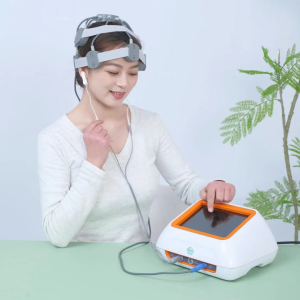In the ever-evolving landscape of medical technology, Transcranial Magnetic Stimulation (TMS) has emerged as a revolutionary approach to treating a variety of neurological and psychiatric conditions. QIJIA, a leading name in medical device manufacturing, offers state-of-the-art CE-certified TMS equipment, and also provides TMS OEM/ODM manufacturing services, catering to the diverse needs of healthcare providers worldwide.
How TMS Works: A Closer Look at the Principle
At its core, TMS is a non-invasive technique that utilizes magnetic fields to stimulate nerve cells in the brain. A specially designed coil, when placed near the scalp, generates a rapidly changing magnetic field. This magnetic field can penetrate the skull with ease and induce an electric current in the underlying brain tissue.
According to Faraday’s law of electromagnetic induction, the changing magnetic field creates an electric current in the neural tissue, which in turn can either excite or inhibit the activity of neurons, depending on the frequency of the magnetic pulses. For example, high-frequency stimulation (above 1 Hz) is generally associated with excitatory effects on the neurons, while low-frequency stimulation (1 Hz or less) has inhibitory effects. This ability to precisely modulate neural activity is the key to TMS’s therapeutic potential.
Core Technologies Embodied in QIJIA’s TMS Equipment
QIJIA’s TMS devices are equipped with advanced technologies to ensure accurate and effective treatment. One of the core features is the highly adjustable stimulation parameters. Healthcare providers can fine-tune the frequency, intensity, and duration of the magnetic pulses according to the specific requirements of each patient. This personalized approach maximizes the therapeutic benefits while minimizing potential side effects.
Additionally, QIJIA’s TMS equipment incorporates sophisticated coil designs. These coils are engineered to deliver a focused and uniform magnetic field, ensuring that the targeted brain regions receive the appropriate level of stimulation. The use of high-quality materials in coil construction also contributes to the durability and reliability of the device.

Conditions Treated by TMS
TMS has shown remarkable efficacy in treating a wide range of conditions. It has been widely used in the management of major depressive disorder, especially for patients who have not responded well to traditional antidepressant medications. Clinical studies have demonstrated that TMS can significantly improve mood and reduce depressive symptoms.
In the field of neurology, TMS is effective for treating epilepsy. Low-frequency TMS can help reduce the frequency and severity of seizures by inhibiting the overactive neural circuits in the brain. It is also beneficial for patients with stroke-related motor and cognitive impairments. TMS can stimulate the undamaged areas of the brain to promote neural plasticity and aid in the recovery of lost functions.
Other conditions such as anxiety disorders, obsessive-compulsive disorder, and even some forms of chronic pain can also be alleviated with TMS treatment.
Target User Groups
The target user group for QIJIA’s TMS equipment is diverse. It includes adults and adolescents suffering from neurological and psychiatric disorders. For patients who are reluctant to take medications due to concerns about side effects or who have not achieved satisfactory results with drug-based treatments, TMS offers a viable alternative.
Elderly patients with age-related cognitive decline or those recovering from strokes can also benefit from TMS-assisted rehabilitation. Moreover, TMS can be used in research settings to study brain function and neural plasticity, making it valuable for neuroscientists and medical researchers.
The Benefits of Weak Magnetic Transcranial Magnetic Stimulation
Weak magnetic TMS, in particular, has several advantages. It is associated with a lower risk of side effects compared to more intense forms of stimulation. Patients often report minimal discomfort during the treatment, which typically involves only a mild tapping or buzzing sensation on the scalp. This high tolerability makes it suitable for a wider range of patients, including those with more sensitive nervous systems.
Weak magnetic TMS also allows for a more gradual and subtle modulation of neural activity. This can be especially beneficial for conditions where a delicate balance of brain function needs to be restored, such as in the early stages of neurodegenerative diseases or in cases of mild cognitive impairment.
International Validation of TMS Efficacy
Numerous international studies have validated the effectiveness of TMS. A meta-analysis published in the Journal of the American Medical Association Psychiatry found that TMS was significantly more effective than sham treatment in reducing depressive symptoms in patients with major depressive disorder.
In the field of epilepsy, a study in the Epilepsia journal demonstrated that low-frequency TMS could lead to a significant reduction in seizure frequency in a substantial number of patients. These and many other studies, along with the endorsement of leading international medical societies such as the American Academy of Neurology and the World Federation of Neurology, firmly establish TMS as a reliable and evidence-based treatment option in modern medicine.
Conclusion
In conclusion, QIJIA’s Transcranial Magnetic Stimulation technology, with its advanced features and proven efficacy, is revolutionizing the way we approach the treatment of neurological and psychiatric conditions. Whether you are a patient seeking an alternative treatment option or a healthcare provider looking for cutting-edge medical solutions, TMS offers a promising path forward.
Contact Information:
WhatsApp: +44 7410558633
Email: [email protected] / [email protected]
A Pampas-raised agronomist turned Copenhagen climate-tech analyst, Mat blogs on vertical farming, Nordic jazz drumming, and mindfulness hacks for remote teams. He restores vintage accordions, bikes everywhere—rain or shine—and rates espresso shots on a 100-point spreadsheet.